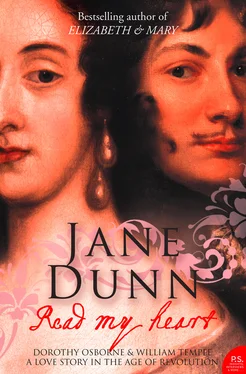Dorothy, however, had been exposed also to the more unruly world of the imagination. She was a keen and serious reader. She immersed herself in the wider moral and emotional landscapes offered by the classics and contemporary French romances, most notably those of de Scudéry. These heroic novels of epic length, sometimes running to ten volumes, enjoyed extraordinary appeal during the mid-seventeenth century. Some offered not just emotional adventure but also the delights of escapism by taking home-based women (for their readers were mostly female) on imaginary journeys across the known world.
Despite having her heart and imagination fired with fables of high romance, Dorothy knew her destiny as an Englishwoman from the respectable if newly impoverished gentry lay in a grittier reality. As she and her brother passed through their own war-scarred land they were faced by the hard truth that the conflict was not yet over and the country was becoming an increasingly disorderly and lawless place. Traditions of accepted behaviour and expectation were upended. Authority, from the local gentry landowners to the king, had been fundamentally challenged and law and order were beginning to crumble. Travelling was dangerous at any time, for the roads were rutted tracks and travellers were vulnerable to desperate or vicious men. There was no police force, and justice in a time of war was random and largely absent. In her memoirs Lady Halkett, * a contemporary of Dorothy’s, noted the increase in unprovoked acts of murderous sectarian violence against individuals: ‘there was too many sad examples of [such] att that time, when the devission was betwixt the King and Parliament, for to betray a master or a friend was looked upon as doing God good service.’ 6
Dorothy recalled later the self-imposed tragedy, witnessed at first hand, of what had become of England, ‘a Country wasted by a Civill warr … Ruin’d and desolated by the long striffe within it to that degree as twill bee usefull to none’. 7 Certainly her family’s fortunes and future prospects appeared to be as ruined as the burned houses and dying cattle they passed on their journey south. However destructive civil war was to life, fortune and security, the social upheavals broke open some of the more stifling conventions of a young unmarried woman’s life. Although exposing her to fear and humiliation, the struggle to save her father propelled Dorothy out of Bedfordshire into a wider horizon and a more demanding and active role in the world.
Now she was on the road again: however disheartening the reasons for her journey, whatever the dangers, she was young enough to rise to this newfound freedom and the possibility of adventure. The bustling activity of other travellers was always interesting, the unpredictability of experience exhilarating to a highly perceptive young woman: for Dorothy the small dramas of people’s lives were a constant diversion. She shared her amusement with her brother Robin on the journey, possibly making similar comments to the following, when she noted the extraordinary diminishment wrought by marriage on a male acquaintance whom she had thought destined for greater things. It is as if she is talking to us directly, confiding this piece of mischievous gossip to an inclined ear:
I was surprised to see, a Man that I had knowne soe handsom, soe capable of being made a pretty gentleman … Transformed into the direct shape of a great Boy newly come from scoole. To see him wholly taken up with running on Errand’s for his wife, and teaching her little dog, tricks, and this was the best of him, for when hee was at leasure to talke, hee would suffer noebody Else to doe it, and by what hee sayd, and the noyse hee made, if you had heard it you would have concluded him drunk with joy that hee had a wife and a pack of houndes. 8
Dorothy’s analytic, philosophical turn of mind always searched for deeper significance as well as humour in the antics of her fellows. Her conversational letters, full of irony and gossip, showed her striving to do right herself and yet highly entertained by the wrongs done by others. As Dorothy and Robin crossed by ferry to the Isle of Wight to await the boat to France there was much to watch and wonder at. When they eventually arrived at the Rose and Crown Inn they had the added piquancy of being close to the forbidding Norman fortress, Carisbrooke Castle, where Charles I was imprisoned, with all the attendant speculation around his recent incarceration and various attempts at escape and rescue.
Also en route to France was a young man of quite extraordinary good looks and ardent nature. William Temple was only twenty and had evaded most of the bitter legacies and depredations of the civil war. His family were parliamentarians, his father sometime Master of the Rolls in Ireland and a member of parliament there. William was his eldest son and although not dedicated to scholarship was highly intelligent and curious about the world, with an optimistic view of human nature. His easy manners, interest in others and natural charm were so infectious that his sister Martha claimed that on a good day no one, male or female, could resist him. Sent abroad by his father to broaden his education and protect him from the worst of the war at home, William Temple, naturally independent-minded and tolerant, avoided playing his part in the sectarianism that divided families and destroyed lives.
There was nothing, after all, to keep him at home, as his sister later explained: ‘1648 [was] a time so dismal to England, that none but those who were the occasion of those disorders in their Country, could have bin sorry to leave it.’ 9 William headed first for the Isle of Wight to visit his uncle Sir John Dingley who owned a large estate there. He had another more controversial family member on the island, his cousin Colonel Robert Hammond, * who as the governor of Carisbrooke Castle had the unenviable task of keeping the defeated king confined.
Having lost the first of the civil wars and in fear for his life, Charles I had escaped from Hampton Court in November 1647 but, like his grandmother Mary Queen of Scots nearly eighty years before, had decided against fleeing to France. Instead he turned up on the shores of the Isle of Wight. Taken into captivity in Carisbrooke Castle, Charles’s restive mind turned on schemes of rescue. He was plotting an uprising of the Scots and hoping even for help from the French, encouraged by his queen Henrietta Maria who had sought asylum there.
There has been some speculation that William may have visited his Hammond cousin too and seen the king at this time. If he did see Charles he was not impressed. In a later essay, written in his early twenties, he wrote disparagingly about how disappointed he was with the Archduke Leopold † in the flesh after his ‘towring titles gave mee occasion to draw his picture like the Knight that kills the Gyant in a Romance’. The sight instead of a mere mortal, in fact a very ordinary man that ‘methinks … looks as like Tom or Dick as ever I saw any body in my life’ reminded him of the commonplace appearance and ‘aire of our late King’. 10 Emotionally, William was more royalist than parliamentarian but this less than respectful reference just three years after Charles’s traumatic execution, to what true royalists at that time would consider a martyred king, revealed his independent mind in action. To write of the ‘aire’ or manner of the king also suggested he had seen Charles I in life. If this was so then this visit to the Isle of Wight was the probable occasion for such a meeting.
Whether he saw the king or not, the most momentous event that year for William Temple was his chance meeting with Dorothy Osborne, a coup de foudre that transformed their lives. In 1648, probably in the early summer, an unexpected and potentially inflammatory confrontation with the nervous authorities on the island propelled their attraction for each other into something deeper. Just as Dorothy and her brother Robin were on their way to embark the boat for France, Robin impulsively ran back to the inn where they had just spent the night. A hotheaded young royalist, his outrage at the imprisonment of the king, and possibly festering resentment of his father’s ill-treatment too, had been fuelled by their proximity to the castle. With the diamond from a ring he scratched into the window pane a biblical quotation in defiant protest at Governor Hammond’s actions: ‘And Hammon was hanged upon the gallows he had prepared for Mordecai.’ 11 The insult was not just aimed at Hammond, it implied (for everyone knew their Bible) a complete political reversal and the confounding of one’s enemies. The unwritten next sentence was: ‘Then was the King’s wrath pacified.’
Читать дальше












